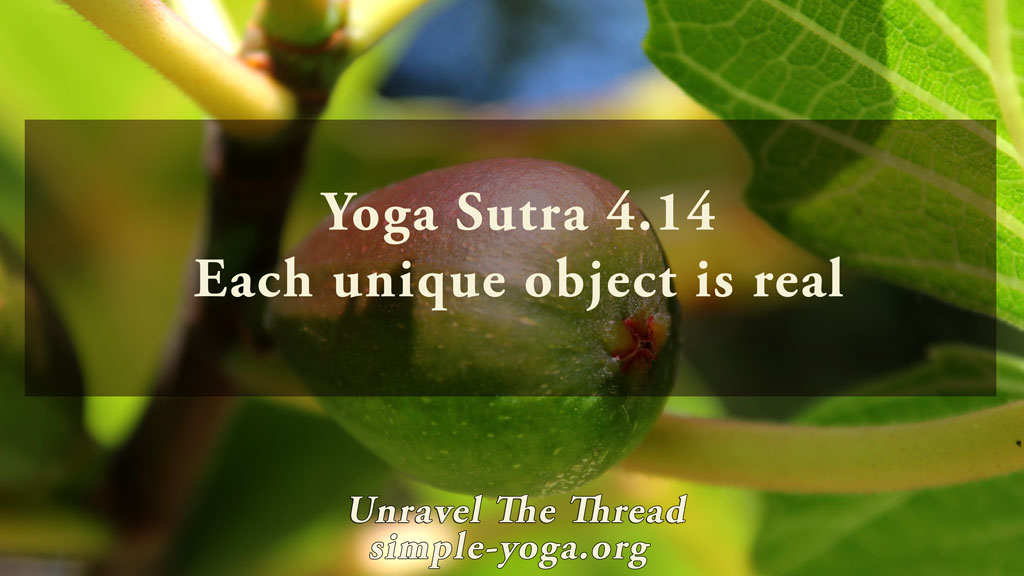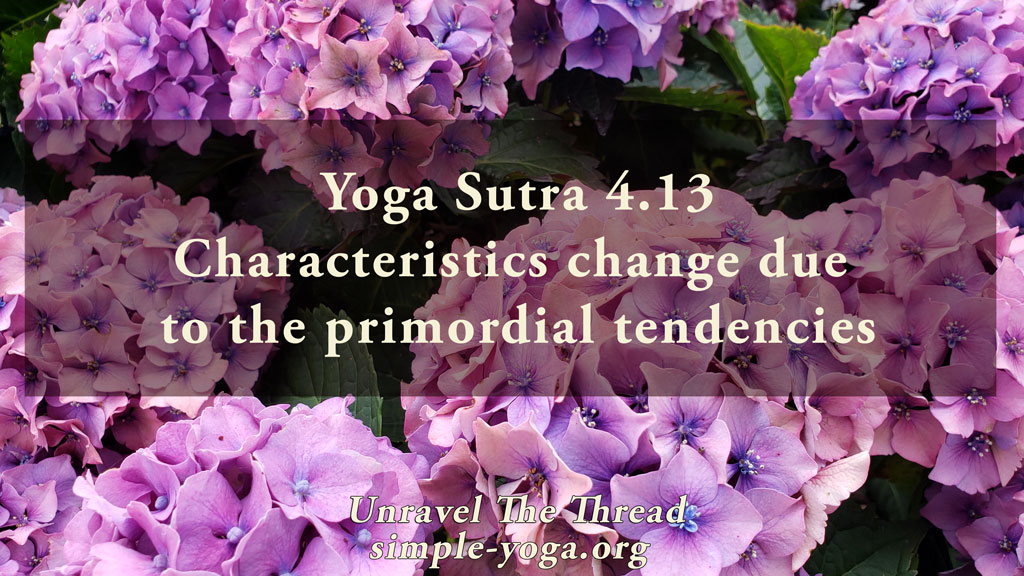Video yoga for low back and hip relaxation
August 27, 2022
4.14 Each unique object is real
September 5, 2022Video yoga for low back and hip relaxation
August 27, 2022
4.14 Each unique object is real
September 5, 20224.13 Characteristics change due to primordial tendencies.

4.13 Manifest or subtle, characteristics change due to the primordial tendencies (gunas) of nature.
This sutra relates to the ideas presented in aphorisms 2.18 and 3.14. Anything that can be perceived will be influenced by a combination of the three fundamental tendencies in nature. These tendencies, the gunas are inertia (tamas), activity (rajas), and harmony (sattva). When internal activity and reactivity are stilled through meditation, it is possible to notice the underlying essence of what is perceived along with its characteristics. Meditating on the changes of its characteristics reveals the past and future of the object meditated upon (3.14-3.16 & 4.12). The process is related to subconscious impressions. As part of nature, subconscious impressions are influenced by these primordial tendencies. Nature follows its course. In other words, your impressions result in inclinations and tendencies according to the intentions motivating your thoughts, actions, and interactions. You do have a choice, especially when you become aware of your tendencies and their effects on your ways of being. In some cases, you are influenced by your own inertia (tamas), like when you have decided to ride your bike more often because it is enjoyable and a good way to exercise, but when it is time to go to a place nearby you override that previous decision because it is more convenient to drive your car. Other times, your own excitement may lead you to overreach beyond your capacities, leading you to exhaust your energy (rajas). On other occasions, you make choices that feel balanced, require an appropriate amount of energy and have balancing effects (sattva). So, even when you are not aware of your own inclinations, just living your life you may notice that every time a situation manifests you have choices for your actions. Your choices and actions will be influenced by your past impressions as well as by the three fundamental tendencies in nature. The sensations, emotions, and thoughts that you perceive at any point may indicate the presence of some of your conscious and unconscious impressions, in tandem with the primordial tendencies of nature.
When your choices are entangled in your sense of identity, they will tend to bring up more agitation. For instance, when you have an interaction with a colleague and you are trying to impose your idea or perspective because you want to impress or you want to feel superior, it will be challenging for you to stand outside your own identity. Thus, it will be harder for you to witness the situation from your own presence in order to make a balanced choice. Similarly, the way you interact with others is influenced by the primordial tendencies of nature. When you feel agitated or anxious, your ways of moving and speaking are different from when you feel tired or lethargic. These ways of expressing yourself also change when you feel at peace and satisfied.
How can you become aware of the effects of the basic tendencies of nature in your own inner world?
To what extent are some of your thoughts, emotions, and actions influenced by inertia, agitation and harmony?
Do your activities influence your own levels of energy?
Are you able to regulate your own energy levels?
Can the eight limbs of yoga (from Chapter Two of the Yoga Sutra) offer you ways to fine tune your ways of participating?
When you do something, can you notice your own habitual patterns?
Do you engage superficially or with too much intensity?
What feedback offers you cues to modulate your actions?
Is it possible that your tendencies are constantly offering you lessons to learn? In fact, is it possible that everything in nature can be seen either as pure sensual enjoyment or as a way to connect to your true nature as intimated in sutra 2.18?
What would happen if you contemplate this idea: Is life a foe trying to set you up to suffer or a compassionate teacher helping you move towards greater integration?
Can every single action and every single interaction be an opportunity for presence?
As usual, one more way of exploring the meaning of this sutra is by chanting it.
You can choose to chant it in its traditional form with some of the words coming together:
4.13 te vyaktasūkṣmāḥ guṇātmānaḥ
ते व्यक्तसूक्ष्माः गुणात्मानः ॥१३॥
Another option is to chant each word in the sutra individually:
- te
- vyakta
- sūkṣmāḥ
- guṇa
- ātmānaḥ
If you prefer, you may listen to the podcast:
This is an excerpt from the book Unravel the thread: Applying the ancient wisdom of yoga to live a happy life
If you find Simple-Yoga.org and Unravel the thread useful, consider supporting my labor with a donation, you may also donate using PayPal or Venmo. Thank you!
